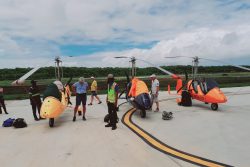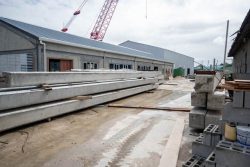Food security in Indigenous villages has become a growing concern for residents as travel restrictions to limit the spread of the novel coronavirus disease (COVID-19) and the increased cost of flights have negatively impacted the delivery of basic necessities to the usually remote communities.
Several Indigenous villages have reported that they are experiencing a shortage of food and fuel supplies due to limited transportation options even as some roads and rivers are closed to traffic. Many Indigenous communities rely mainly on air and water transportation for delivery of food items. However, with transportation service providers asked to transport less persons, the cost of freight has reportedly doubled further impacting supplies.
In a discussion, ‘Indigenous Peoples responses to the threat of COVID-19 in Guyana’, hosted on Facebook by non-governmental organisation the Amerindian People’s Association (APA) yesterday, representative Michael McGarrell said that there has been a steep rise in freight prices and with many breadwinners at home, families will not be able to purchase food.
“Indeed there has been a steep rise in freight [by local air transportation providers] to take goods into the villages. The prices are alarming and what it will do to communities is the already high price will go up significantly and this will cause our communities to suffer more,” said McGarrell, the Geographic Information System specialist and Forest Policy Officer at the APA. He added that business owners will increase the prices to recover the transportation costs.
On this note, McGarrell, supported by his colleagues, Laura George, APA Governance and Rights Coordinator, and Jean La Rose, APA Executive Director, called on government to subsidise the cost of domestic air service providers and coordinate with community leaders to ensure that villages have an adequate supply of food.
Stabroek News understands that Air Services Limited, which operates three weekly flights to Paramakatoi, Region Eight, have increased their prices. For freight, the price has moved from $130 to $290/pound and return airfare from $33,000 per person to $68,000.
The prices for items such as salt, sugar and flour, have increased significantly and persons are unable to purchase these items, Stabroek News was told.
“What I would like to see is…the cost of the flights subsidised because of the already high cost of living; the cost of basic items is already high and have severely increased now…For example in Region Eight, the North Pakaraimas, and [the] Upper Mazaruni villages in Region Seven were severely impacted by heavy flooding in 2017 and they are still trying to rebound from that. They have been very hard working to get their farms going and things like that but the May/June rains are coming again and they are at risk,” George said, as she explained the plight some villages face.
Imposed
For the riverain communities of Orealla and Siparuta, residents have been reporting fuel and food shortages. Residents of the community, which sits on the banks of the Corentyne River and which depends heavily on food supplies from Corriverton in Berbice, are not allowed to freely use the river due to measures imposed by Suriname, which has ownership of the waterway.
According to residents, supplies at shops are low and fuel for the community water pump and power generators are close to finishing. When the fuel runs out, they will not be able to access clean drinking water or electricity in the community.
The villages are calling on the authorities to step in and offer assistance to alleviate their plight.
La Rose stated that many communities are not prepared to handle situations such as this. She suggested that authorities should have made provisions for Indigenous communities before imposing the COVID-19 preventative measures.
“Unfortunately for some of our Indigenous communities, they need a lot of preparation to deal with issues like this. Things like rice, sugar, salt and so has to be taken in by boat, taken in by plane and to make a sudden stop and not give these communities the time to make these provisions available can have a very heavy effect on those communities that depend on supplies to be trucked in, to be flown or brought in by boats,” La Rose posited. “What are the systems in place to support such communities in such situations where the food supplies [are] hindered in the long term,” she questioned.
The APA head said systems need to be put in place to address the situation.
La Rose also suggested that the Civil Defence Commission (CDC) reach out to community leaders to effectively plan their aid distribution in order for every household to benefit.
McGarrell used the opportunity to recommend to the CDC to included plant seed packages in their aid hampers and encourage persons to start up a garden so that they can be able to sustain themselves should the COVID-19 situation remain for months.
“I am aware that a lot of our people have moved away from farming and this will be the time they will really understand the value of having a farm. One of the things we have been thinking is that if the CDC provides packages that can help, they should also make seeds available and encourage people to farm because this COVID-19 will not just go away like that and we have to find ways to consider the sustainability of any sort of relief packages. In doing that, use farms as a way to ensure people are able to survive for the next couple of months,” McGarrell stressed.
The CDC’s aid effort has been paused and is currently being restructured to cater for a long-term programme. For the first phase of the relief effort, no Indigenous community received any aid packages.










